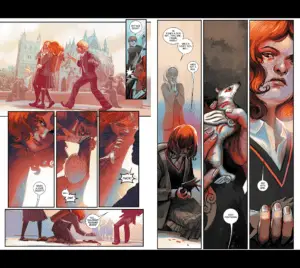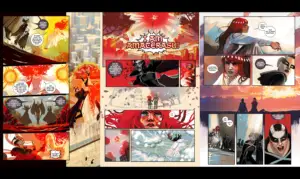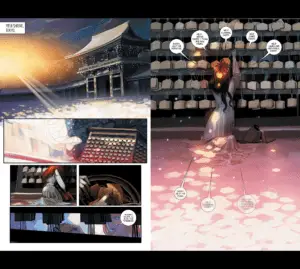Last issue, we had a ‘re-mix’ in terms of aesthetics and approach. It’s a suitable way to approach a character as controversial as Woden, and that’s being generous. When you have somebody who’s been a dick for so long, seeing their perspective on past events can be surprisingly revealing. And oh dear, this certainly was revealing. Woden did not appear in any kinder of a light; in fact, he looked like even more of a dick. However, the result was better view on the larger narrative.
Even so, we still understand precious little. We could either sit and scratch our heads or return to Commercial Suicide’s gimmick. After the ‘re-mix’ of Jamie McKelvie’s pens, we get a fresh look at Amaterasu through Stephanie Hans’ lovely style. I assure you, her work on this particular issue is an absolute delight. Her rich style is more than suitable for a number where passions rise high. Scorching high.
Issue #15
“You’re Doing This Wrong”
Looking at the character in the present, it’s easy to read cultural appropriation into WicDiv‘s Amaterasu. The character is actually interpreted in this manner in the story proper. White English girl incarnating a Shinto Sun Goddess; it’s not exactly a subtle transition.
However, one look into her child-self imbues her representation with some curious legitimacy. Her Amaterasu doll, which a bully tries snatching from her, is no mere affectation. Rather it’s something that evokes passion in her, and kids do know better when it comes to passions. Of course, this young passion looks kind of worth fuck-all when she grows to represent the goddess in an almost caricaturesque way. And you know that’s saying aplenty in the context of literal gods walking among us.

A message from her Pantheon peers brings her back from a Meiji Shrine in Tokyo to a hospital in London. She has been summoned, as have several others, to mourn Tara’s death. It’s mighty rich that these people now mourn somebody they cared little for. It’s even richer that Ananke sells Baphomet as the responsible party.
Furthermore, she even drops that a child of darkness, a demon, may be involved. The old light versus dark discourse is old as shit, and Dionysus knows it. The guy is quite the master of irony. He occasionally wears a shirt that says ‘You Only Live Forever’ when he has only two years left. And in spite, of being the God of Wine, he seems to be the only sober mind in the room. Woden may be too, but fuck him.
Dionysus’ disposition, and his resentment about his friend Morrigan’s imprisonment, causes him to leave. From then on, tensions rise amidst the gods present. One by one, all leave in varying degrees of annoyance. All but two, Amaterasu and Woden. Talk about two people you’d never want to leave in a room alone (Woden and anyone, really). Not much happens, though. Still, Amaterasu has other people to see at the hospital, namely former Valkyrie Kerry. Minerva is at her side, because she’s a responsible kid. The young lady tells Amaterasu that the other gods wouldn’t let her see Tara. The Sun Goddess agrees with the decision, reasoned through a brief panel of a flashback that hints that she saw something similar at Minnie’s age. Yay for concealed traumas.

Minerva confesses that she’s been restless as of late. Doing honor to her status as Goddess of Wisdom, she’s thought a lot on everything. Her conclusion? The Luci-affair, Morrigan’s doings; it doesn’t add up. The readers’ collective inner voice may be screaming ‘Why are grownups so dumb?’ Alas, somebody beats us to the interjection, and for an entirely different reason. Urdr and her Norns have come to the hospital as well. The presence of Beth and her asshole duo incenses her former boss. But Urdr’s deconstruction of Amaterasu’s identity incenses the latter. Thus, a confrontation ensues, and we do love these, don’t we?
Amaterasu loses her cool big-time, and transports herself, Urdr and the Norns to Japan. Specifically, she transports them to Hiroshima, Japan. Right from the get-go, this is looking highly problematic. Amaterasu’s discourse doesn’t make things any better. Her ethos may be pure, unabashed passion, and she does appear to be a generally well-meaning character.
Still, her fury against Urdr’s perceived apathy distorts this personal code. She ends up looking like a furious child next to Urdr’s cooler, comparatively more composed self. Actually, a burning wicker man with Nicolas Cage inside is more composed next to Amaterasu, if you dare call her by her birth name, Hazel. Naturally, Urdr (whom we can comfortably call Cass anytime) does this exact thing.
All sound and fury, and signifying almost nothing, Amaterasu takes Cass to the sky. With a fierce scream of self-assertion, she declares she is AMATERASU, burning bright over Japan. Specifically over Hiroshima, Japan. You bet your lovely limbs Cass calls her out on how mindlessly offensive this is. The realization gets the Sun Goddess to chill and listen. We didn’t get a confrontation ala Marvel (which Urdr totally deconstructed). But we did get self-awareness from a thematically problematic deity.
While they sort of bond over this, Amaterasu and Urdr are clearly on opposite sides, in terms of reason. The former believes everything happens for a reason, while the latter thinks nothing happens for a reason.
Both are polar opposites in terms of their self-perception as deities. The ethical contrast is more than apt, given the invariable fact that death is looming over them. It’s not a duality over fatalism, but over the question of whether or not things can mean anything in a world where they can also mean nothing. In literary terms, it’s a reprisal of what I believe to be the ultimate genre-and-ethos duality. Romanticism vs. Post-Modernism.

There is great irony in the fact that Urdr deconstructs the concept of her own godhood. In denying the reason or immanence behind circumstances, she denies the fate over which she presides. Knowing Cass, this is very much intended. Urdr only looks at her position in pragmatic terms.
Yet Amaterasu truly does believe in significance. Her candor in this fashion is a thematic call-back to her words in Issue #1. Although divinity might have come only by chance, she will make the most of it. Her faith is not any less true than her child self’s. In fact, this faith reminds her that there is a place she has to be. Amusingly, she leaves Cassandra where they landed, to which she angrily protests.
This place is where we found her at the beginning. The Meiji Shrine. She walks in and resumes what she meant to do at the beginning of the issue. Praying, as per the Shinto tradition. Praying to her father to look over the people she cares for.
Throughout the issue, we had several flashbacks concerning her father’s death, and the effect it had on her. Grief and loss can sometimes lead to love, and for some, to prayer. A prayer for Laura and her family, for Lucifer, for Inanna, for the dying and for the troubled. The fading speech bubbles make it clear that she’ll be there for a while. There is much pain and torment at this point. And it won’t be decreasing anytime soon.

The flashback page by Jamie McKelvie shows Amaterasu and Kerry, as Brunhilde, chilling. The Sun Goddess is showing the Valkyrie a ring Woden gave to her. Woden giving anyone a gift is a fair equivalent to Michael Richards giving crack to the children of the world. It’s not something you do with a trusting disposition. The meeting was being streamed, which majorly pisses “Brunhildy” off. She must have a reason, she must have scores of them, in fact. In light of what we learned about Woden last issues, and the implications present in this scene, it only makes sense Brunhilde would react as she did.
The Wicked + The Divine Issue #15 Credits
Writer: Kieron Gillen
Art / Cover: Jamie McKelvie, Matt Wilson, Stephanie Hans

